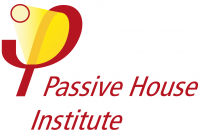Category:PHI
Passive House Institute (PHI): Superior energy efficiency in buildings
The Passive House Institute (PHI) is an independent research institute lead by Dr. Wolfgang Feist with a continuously growing interdisciplinary team of employees. The PHI has played an especially decisive role in the development of the Passive House concept. The first pilot project (Kranichstein Passive House, Darmstadt, Germany, 1990) was Europe’s first inhabited multi-family house to achieve a documented heating energy consumption of less than 12 kWh/(m²a), a consumption level that has been confirmed through years of detailed monitoring.
Ever since then the Passive House Institute has assumed a leading position with regard to research on and development of construction concepts, building components, planning tools and quality assurance for especially energy efficient buildings.
Passive House Institute organigramme
The PHI has been responsible for building physics related consultancy and technical guidance on a number of firsts including the first Passive House office building, the first Passive House factory, the first Passive House school buildings, the first Passive House indoor swimming pools and the first Passive House retrofits. The Institute is currently providing its expertise for numerous new, innovative projects. In addition, the Passive House Institute constantly provides access to latest developments and findings by publishing books and studies on specific topics related to high energy performance of buildings, such as highly energy efficient retrofits or different aspects of energy efficient constructions in the different climate zones of the world.
Passive House Institute references
The annual International Passive House Conference as well as the sessions of the Research Group for Cost-effective Passive Houses are also organized by the Passive House Institute. The Research Group sessions have given rise to numerous Passive House building projects throughout Germany and beyond; the practice-oriented proceedings of these sessions are available through the Passive House Institute. The annual International Passive House Conferences, in turn, serve as a global exchange platform for scientists, architects, engineers and product developers in the field of energy efficient construction and refurbishment (www.passivehouse-conference.org).The Passive House Institute is constantly developing and improving upon algorithms and software tools for dynamic building simulations, the determination of energy balances and the planning of Passive House buildings (for example, through the Passive House Planning Package).
PHI research staff also provides manufacturers of energy efficient components all over the world with in-depth consultancy on product development and optimization of their products. The PHI further facilitates the upholding of the strict quality requirements of the Passive House Standard through a certification system for professionals which is offered worldwide (Certified Passive House Designer and Consultant as well as Certified Passive House Tradesperson).
The Institute acts globally as an independent testing and certification center for buildings and building components such as wall and construction systems, windows, doors, connections, ventilation systems and compact systems. It hosts a global network of architects, engineers and manufacturers organized as International Passive House Association (iPHA).
Visit the official website of the Passive House Institute:
www.passivehouse.com
Subcategories
This category has only the following subcategory.
P
Pages in category "PHI"
The following 8 pages are in this category, out of 8 total.
